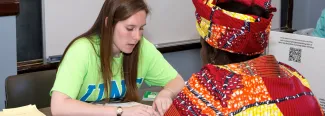Building Community Through Service
Service Learning in Action
Each semester, UNE health professions students take part in community-based service learning that brings classroom lessons to life. Through projects promoting wellness and connection—from chair yoga at the Cumberland County Jail to harm reduction kits for residents reentering their communities—students gain hands-on experience, build empathy, and prepare to meet real-world public health challenges.
Students Volunteer at Local Jail
Supporting Harm Reduction
Additional Information
The Office of Service Learning maintains strong ties to the local community and with many agencies and nonprofits where students can take an active role in serving the community, providing useful research, and promoting health within vulnerable populations in Cumberland County and beyond.
Should individuals, clubs, or academic departments be interested in pursuing other partnerships and/or activities, the Service Learning Program is always available to help assist and support these endeavors.
Homeless Health Outreach
Since fall 2012, interprofessional teams of students and faculty have been working collaboratively to implement service learning activities at the Milestone Foundation Shelter and Detoxification Facility in Portland, Maine. Service projects at the shelter focus on providing opportunities for discussion and support of homeless individuals with substance abuse problems through foot assessments, soaks, and washings.
Learn more about Homeless Health Outreach
Cumberland County Jail
Since fall 2012, interprofessional teams of students have been working collaboratively with staff and inmates of Cumberland County Jail (CCJ) to design service projects. The projects focus on providing inmates with opportunities for healthy living in such areas as improved nutrition, infectious disease prevention, stress management skills, increased physical activity, and opportunities for discussion and support.
Learn more about the Cumberland County Jail Collaborative Project
International Service Opportunities
Reaching a Milestone: UNE Service Learning
Students from Nursing, Physical Therapy, Physician Assistant, Occupational Therapy, and Pharmacy, together with faculty mentors from each program, provide twice-monthly foot clinics to clients in both the shelter and detox floors. It is a transformational experience for both the students and clients alike and is a lesson in humility, human connection, and health promotion.
